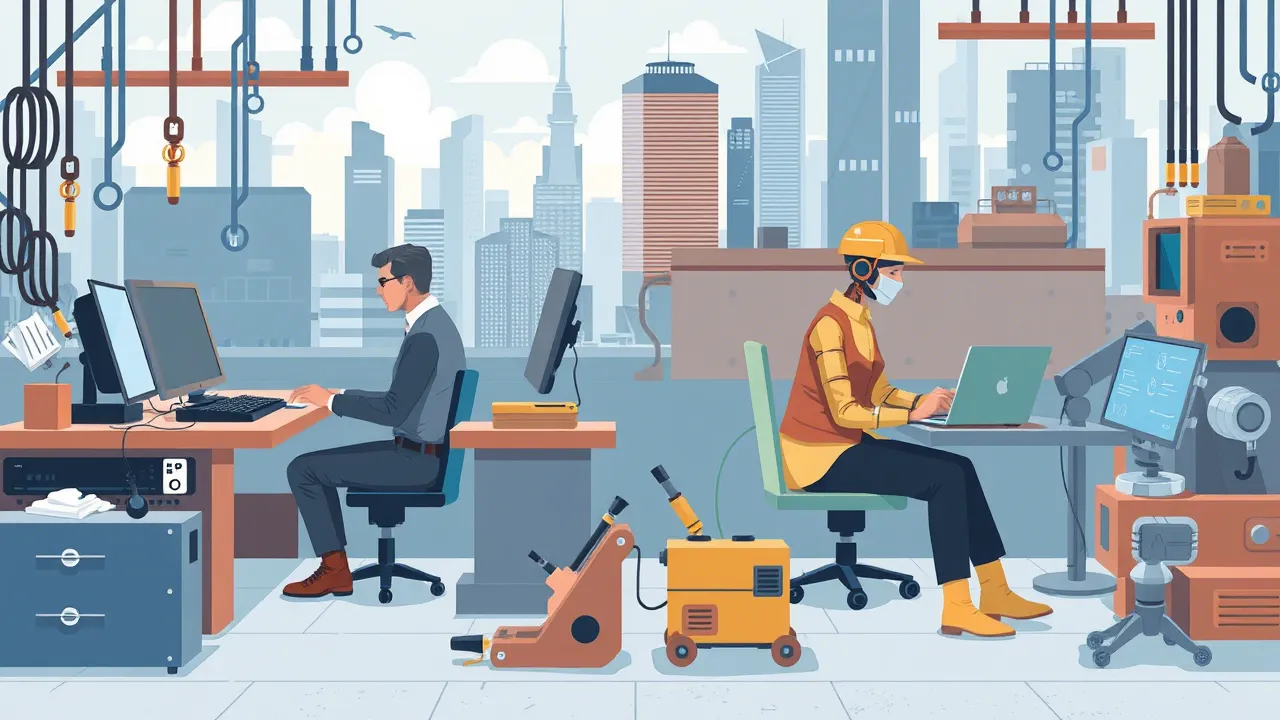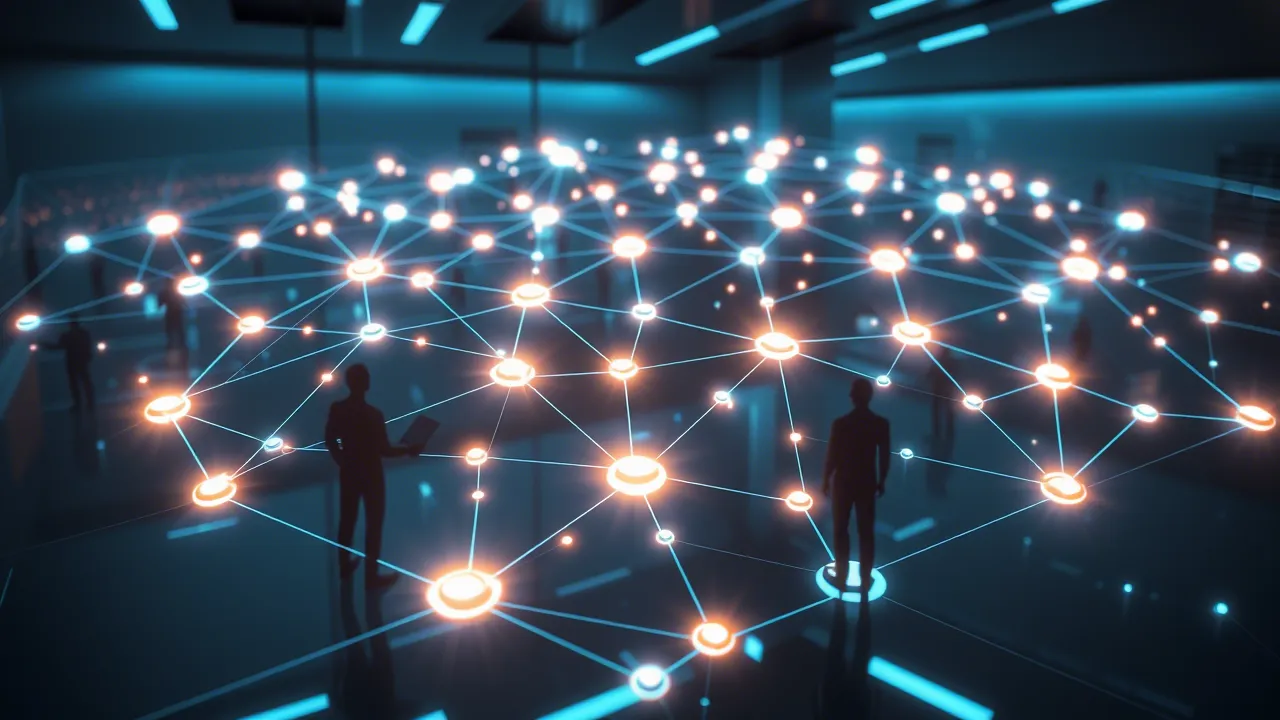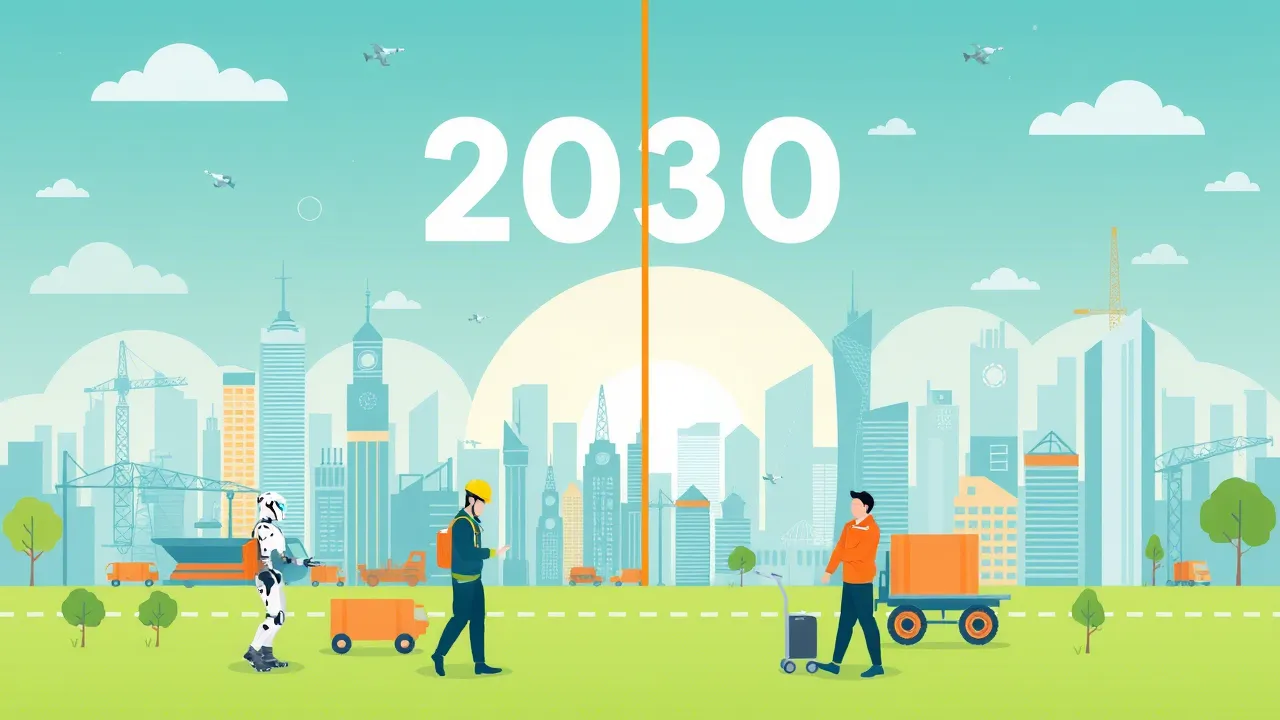Introduction: A Tectonic Shift in the Labor Market – What Awaits Us?
The labor market as we knew it may be living out its final years. By 2030, artificial intelligence promises to become not just another technological novelty, but the very fabric of our economy – a true tectonic shift capable of turning familiar career landscapes upside down. Already today, in 2025, we are seeing not just alarming signs, but a real prelude to the coming storm – look at the facts:
- According to expert estimates (e.g., Goldman Sachs), up to 25% of routine tasks across various industries can already be effectively automated using existing AI technologies.
- The World Economic Forum, in its reports, predicts that in the next five years, around 83 million jobs worldwide may disappear or be radically transformed due to technological changes, including the rapid development of AI.
- More than half of all workers (according to some studies, about 54%) have already realized the need for, or even begun, significant reskilling by this year to adapt to new AI-driven market demands.
- And this isn't just from the employees' perspective: 75% of CEOs of leading companies expect generative AI to fundamentally change their business models within the next three years (according to PwC surveys).
And this is just the beginning of a large-scale transformation, harbingers of a storm that will change everything by 2030.

The question for each of us is becoming increasingly acute: not whether AI will change your profession, but whether it will exist at all in some five years? Which specialties will be ruthlessly swept away by this wave of automation, and which will not just survive, but perhaps rise from the ashes, becoming more valuable and in-demand than ever before?
This article is your navigator in the world of career storms and opportunities. Based on 2025 trends, we offer a glimpse beyond the horizon to analyze who risks being left overboard and who will ride the crest of the wave in the new AI reality. Are you ready?
Part 1: Echoes of Bygone Eras: Professions on the Verge of Extinction by 2030
AI-based automation is relentlessly advancing into areas where tasks are characterized by a high degree of repetitiveness, predictability, and the possibility of clear algorithmization. By 2030, we are highly likely to witness a significant reduction or even complete disappearance of the following categories of professions:
- Data entry specialists and basic accounting: Routine invoice processing, primary data entry, generation of standard reports – AI already performs all this faster and with fewer errors today.
- First-level call center operators: Advanced AI-powered voice assistants and chatbots can handle most standard customer inquiries 24/7.
- Drivers (trucking, taxis, public transport): The development and cost reduction of autonomous technologies will lead to the gradual displacement of humans from behind the wheel, especially in long-haul transport and urban taxi fleets.
- Cashiers in retail: Self-service systems and automated stores are already proving their effectiveness.
- Assembly line workers in manufacturing: AI-controlled industrial robots are becoming increasingly skilled and affordable, replacing manual labor on assembly lines.
- Junior data analysts (for routine tasks): Although data analysis as a whole will be in demand, the generation of standard reports and initial data processing using tools like Tableau (Forecasting) (or rather, its future AI-enhanced versions) may be fully automated, leaving more complex interpretative and strategic tasks to humans.

This process, undoubtedly, carries serious social challenges. The mass displacement of workers will require states and society to create effective retraining and support systems, and possibly to revise the very concepts of employment and social protection. However, it is important to understand that technological progress cannot be stopped, and the key to the future lies in adaptation and finding new niches.
Part 2: Renaissance of Talents: Professions That AI Will Elevate to a New Level
Against the backdrop of some professions disappearing, others will not just survive but experience a true renaissance, enhanced by AI capabilities. These are the areas where unique human qualities play a key role: creativity, critical thinking, empathy, strategic vision, and complex interpersonal communication skills. Here, AI acts not as a competitor, but as a powerful partner and tool.
Here are just a few examples of transformations and promising directions by 2030:
- Medicine: Doctors will use AI for ultra-precise diagnostics (analyzing images, genetic data), planning complex operations with robotic assistants, and developing personalized treatment plans based on vast amounts of medical data.
- Education: Educators will become mentors and architects of educational trajectories, using AI platforms to create personalized learning programs, adapt content to each student's needs, and free up time for individual work.
- Creative Industries: Designers, artists, musicians, and writers will have incredibly powerful generative AI tools at their disposal (developments of technologies embedded in Adobe Firefly or Midjourney), allowing them to prototype faster, explore new styles, and realize their boldest visions, greatly expanding the boundaries of creativity.
- Software Development and Engineering: Programmers will work in synergy with AI assistants like GitHub Copilot, which will handle routine coding, testing, and bug-finding, allowing developers to concentrate on complex system architecture, innovative solutions, and creative problem-solving.
- Scientific Research: Scientists will be able to make discoveries at an unprecedented speed thanks to AI's ability to analyze huge volumes of data, identify hidden patterns, and model highly complex processes.
- Strategic Management and Business Consulting: Executives and consultants will make more informed and far-sighted decisions based on deep data analysis and predictive analytics provided by AI.

In addition to transforming existing roles, we will see the emergence and active development of entirely new professions at the intersection of human intelligence and AI technologies. Demand is already forming today for "AI trainers" (specialists in training and fine-tuning AI models), "AI ethicists," "human-machine interaction specialists," "prompt engineers" (although this role is also likely to change significantly or integrate into others by 2030), and "AI solutions integrators" in various industries.
Part 3: Arsenal for the Future: Key Skills and a Bold Forecast for 2030
To remain in demand in the new AI economy of 2030, simply having a diploma will not be enough. Specific skills and competencies that allow for effective interaction with AI and solving tasks beyond the capabilities of machines alone will come to the fore.
Key skills of the future:
- Deep technological literacy: This is not just the ability to use programs, but an understanding of the basic principles of AI, the ability to assess its capabilities and limitations, and skills in working with specialized AI tools, for example, in the field of business process automation using platforms like UiPath (with AI) or their more advanced versions.
- Developed cognitive abilities: Critical thinking (the ability to analyze information, identify fakes and biases, including in AI-generated results), systemic thinking, the ability to solve complex, unstructured problems, creativity, and an innovative approach.
- Social-emotional intelligence (EQ): Empathy, effective communication skills, collaboration and teamwork skills (including "human-machine" teams), leadership qualities, adaptability, mental flexibility, and emotional resilience in the face of uncertainty.
- Ability and willingness for Lifelong Learning: In a world where technologies and requirements are changing rapidly, the ability to learn and relearn quickly will become one of the main competitive advantages.

A bold forecast for 2030: In my view, by 2030 we will see not so much the mass disappearance of professions as such, but their profound transformation. Success will accompany those who can become a kind of "AI-centaur" – a specialist who masterfully combines their professional knowledge and human talents with the power of artificial intelligence, using it as a natural extension of their abilities. The focus will definitively shift from performing routine operations to solving unique problems, generating breakthrough ideas, and creating new value in close collaboration with AI. Perhaps the trend towards project-based employment and the formation of a "gig economy 2.0" will also intensify, where highly qualified specialists with a unique set of skills and the ability to effectively manage hybrid teams of humans and AI assistants will be sought after to implement complex and ambitious projects worldwide.
Conclusion: Preparing for a Future That Is Already Here
The revolution driven by artificial intelligence is already changing our world and the labor market. To perceive this solely as a threat is to miss out on colossal opportunities. AI is a most powerful tool capable of multiplying human potential, automating routines, and allowing us to focus on truly creative, strategic, and human-centric tasks.
The future of the labor market in the AI economy of 2030 will be determined by our ability to adapt, learn continuously, and be ready to embrace new rules of the game. This is not a time for fear, but a time for thoughtful action: investing in new knowledge, developing key skills, and forming a vision of one's place in this rapidly changing world. Think about it today, in 2025, because the future is arriving much faster than we sometimes think, and it promises to be incredibly interesting for those who are ready to meet it.
